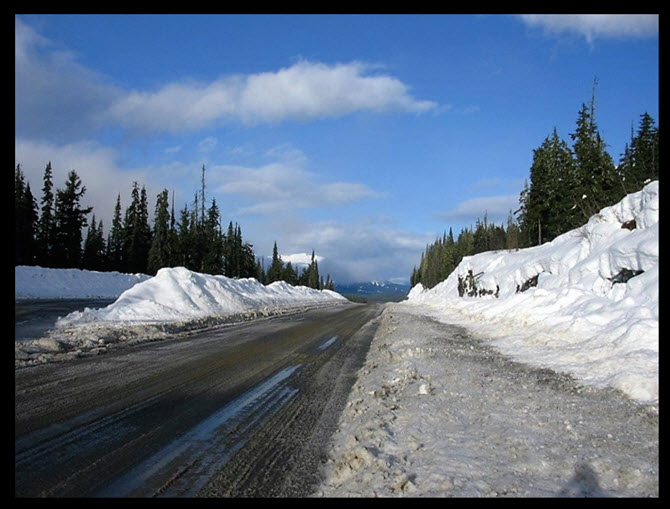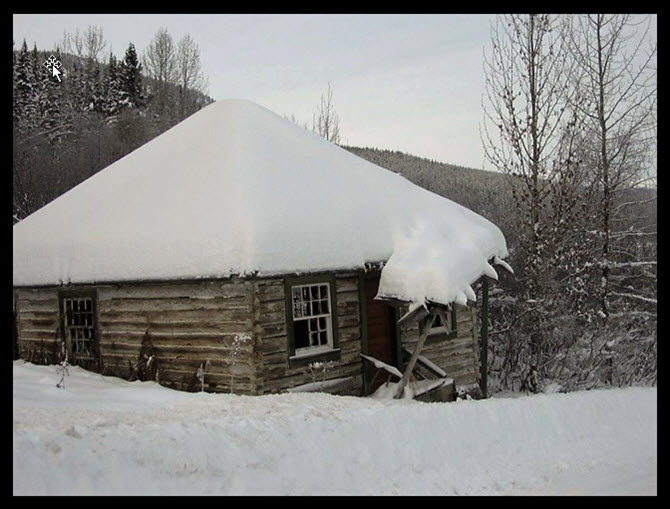“Monday morning, up early as my mind runs through a list of items - flashlight, food, Criminal Code, book tapes, gloves, Child Support Guidelines , satellite phone and robes. An unusual list for anyone except a judge travelling on a northern circuit.”
This is how Judge Ed De Walle began an account of a trip he made to Dease Lake one February several years ago. He continued like this.
“I am preparing to leave my home in Terrace, BC, a forestry community world-famous for salmon fishing and the Kermode bear. I check the truck to ensure everything is in order and head east on “the Yellowhead Highway” (#16) along the Skeena River. Known as the “River of Mists”, it’s living up to its name this morning. The clouds hang low over the mountains.
After an hour I reach the community of Kitwanga in Gitxsan Nation territory. Several historic totem poles dot the landscape. Turning north on Highway 37 I pass a large sign proclaiming “North to Alaska”. I’m now 500 kilometres from Dease Lake - driving time 6 to 7 hours depending on road conditions. Today the road is bad – an avalanche closed it yesterday and rain falling on ice makes for treacherous conditions. As I crest a hill I am greeted by a moose standing in the middle of the road. Thankfully he scrambles off the road before evasive action is needed.
Soon I reach the junction at Meziaden Lake where turning west takes a traveller to Stewart at the southern tip of the Alaskan panhandle. Once a thriving community of 10,000 it now numbers fewer than 500 inhabitants. It still boasts a courtroom built in the 1940’s. I once found an old magistrate’s bench book there containing the notation, “sentence for break and enter $100 fine and six months’ probation with a condition to attend church once a week”.
The court circuit usually spends a day in Stewart but this time I bypass it to spend an extra day in Dease Lake. I stop for lunch at Bell II. Once a classic greasy spoon, it’s now a world class heli-skiing resort. Helicopters are waiting to take skiers back up the mountains after lunch.
Continuing north, I reach the Stikine River where gold was discovered in 1861, bringing thousands into the region. Fur-traders, prospectors, trappers, surveyors and hunters made their way to the Stikine, changing the lives of the Tahltan people who for untold generations had travelled through Telegraph Creek and the Stikine to catch and smoke salmon and trade.

North to Dease Lake
Entering an arctic landscape, I continue past the community of Iskut. Mount Edziza, a dormant volcano that erupted four million years ago lies to the west. Its last basalt flow occurred only ten thousand years ago. In this area it’s not uncommon to see grizzly and black bears during the spring and fall circuits.
It is dark when I finally reach Dease Lake. The temperature is 12 degrees below zero and fresh snow covers the ground. I check into the only motel and prepare for a communal dinner with the court staff, then turn in early. In the morning I walk over to the courtroom located in the basement of the school board office building. As I pass through the crowd in the lobby I overhear a woman say, “This is a scary place”. I ponder her words as I change into my robes.
Crown and defence counsel are organized and I move through the cases on the court list. Most of the criminal cases involve violence, and sadly, almost every case is based on alcohol abuse. There are eight trials scheduled including a full day stabbing case that is adjourned to the next day. During the morning break I meet with two women from the Ku We gahn Justice Program that serves the communities of Telegraph Creek, Dease Lake and Iskut. They tell me about the work they do - probation monitoring, diversion programs and victims services. They describe their concern for the protection of victims, mainly women in abusive relationships, with minimal community services. I listen carefully and I agree to keep in touch. They invite me to visit the local transition home and I promise to do so.
Back in court I press on. There are two family cases. The first is quickly settled but the second involves young children and is more complex. I suggest a case conference and the parties nod their agreement. I close court to the public, remove my robe and move to the counsel table. I enjoy case conferences and it does not take long to determine the underlying issues. After half an hour both parties agree to the terms of a consent order. They appear pleased to have avoided an adversarial and public argument.
The next day several of the trials turn into guilty pleas and sentencings. The stabbing case proceeds and witnesses are called. The trial finishes at the end of the day. There is a guilty verdict and defence counsel requests an adjournment to prepare for sentencing.

Abandoned cabin, Dease Lake
That evening I continue to ponder the words of the woman in the lobby. I know that I am a stranger in this land even though I have been travelling here for 25 years. We are outsiders, bringing a system of justice that only we are familiar and comfortable with. The Court is independent and that is surely a good thing in these small communities. Perhaps court should be a scary place for someone charged with a serous crime, but what about the usual summary and family matters? If the Tahltan came to my community to judge, would I be scared?
Her words remind me that I must bring justice in humility, recognizing that I yield awesome power. I must be careful to listen carefully, to speak plain words and avoid legal terminology. I should make every effort to learn about the communities I serve, their history, culture and traditions. I must recognize that there is much work to be done in the areas of reconciliation and healing, particularly between offenders and victims. When I drive away from Dease Lake the offender and the victim are left to live together, often within walking distance of each other.
A northern circuit is a tiring and at the same time invigorating experience. It can also be very rewarding. Every judge should have the opportunity to go “on circuit” and experience first hand dispensing justice in remote and isolated communities. Value – priceless!”
A version of this article was first published in the Canadian Association of Provincial Court Judges Journal, Summer 2005/volume 28, no. 1. Judges who have sat in Dease Lake more recently report that the travel experience hasn’t changed and violence and alcohol abuse remain significant problems. They also comment positively on the community engagement and support provided to parents by family workers from the Iskut band, parents’ willingness to work with the Ministry of Children and Family Development, and their commitment to keeping their children in the community.

